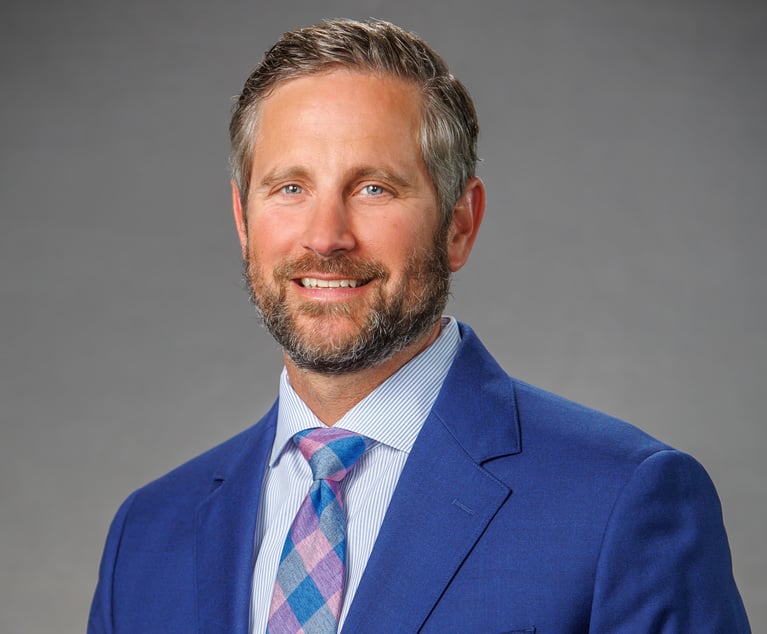 Edward T. Kang, left, and Kandis Kovalsky, right, of Kang Haggerty.
Edward T. Kang, left, and Kandis Kovalsky, right, of Kang Haggerty. Fighting Fraud in Health Care Through the False Claims Act in the Third Circuit
The Third Circuit has adopted a more plaintiff/relator friendly interpretation while the Eighth Circuit has reached the opposite conclusion. Until the U.S. Supreme Court settles the circuit split, choice of venue is key for those bringing claims under the Anti-Kickback statute.
December 01, 2022 at 11:55 AM
8 minute read
The U.S. health care industry is a fraudster's paradise. While the vast majority of the players in the industry are focused on saving lives and improving health care for patients, fraudsters use this goodwill to their benefit. The health care industry is also buoyed by significant government funding—be it through Medicare, Medicaid, or the many grant programs designed to support health systems nationwide. Fraudsters manipulate these programs, and the goodwill associated with them, to steal funds from the government to line their pockets.
A major health care industry overhaul occurred in 2010 with the passage of the Patient Protection and Affordable Care Act, otherwise known as just the Affordable Care Act or, colloquially, Obamacare. The bill attempted to help block fraudsters by amending a longstanding Anti-Kickback statute to assure that fraudsters could not use the government funding programs contained in the ACA to further their fraudulent schemes. In the decade since the ACA's passage, the courts' interpretation of the Anti-Kickback statute in relation to ACA fraud has become split, with the split most notable between the U.S. Court of Appeals for the Third and the Eighth Circuits. The Third Circuit has adopted a more plaintiff/relator friendly interpretation while the Eighth Circuit has reached the opposite conclusion. Until the U.S. Supreme Court settles the circuit split, choice of venue is key for those bringing claims under the Anti-Kickback statute.
This content has been archived. It is available through our partners, LexisNexis® and Bloomberg Law.
To view this content, please continue to their sites.
Not a Lexis Subscriber?
Subscribe Now
Not a Bloomberg Law Subscriber?
Subscribe Now
NOT FOR REPRINT
© 2025 ALM Global, LLC, All Rights Reserved. Request academic re-use from www.copyright.com. All other uses, submit a request to [email protected]. For more information visit Asset & Logo Licensing.
You Might Like
View All
3rd Circ Orders SEC to Explain ‘How and When the Federal Securities Laws Apply to Digital Assets’
5 minute read

Products Liability: The Absence of Other Similar Claims—a Defense or a Misleading Effort to Sway a Jury?

Church of Scientology Set to Depose Phila. Attorney in Sexual Abuse Case
5 minute readTrending Stories
Who Got The Work
J. Brugh Lower of Gibbons has entered an appearance for industrial equipment supplier Devco Corporation in a pending trademark infringement lawsuit. The suit, accusing the defendant of selling knock-off Graco products, was filed Dec. 18 in New Jersey District Court by Rivkin Radler on behalf of Graco Inc. and Graco Minnesota. The case, assigned to U.S. District Judge Zahid N. Quraishi, is 3:24-cv-11294, Graco Inc. et al v. Devco Corporation.
Who Got The Work
Rebecca Maller-Stein and Kent A. Yalowitz of Arnold & Porter Kaye Scholer have entered their appearances for Hanaco Venture Capital and its executives, Lior Prosor and David Frankel, in a pending securities lawsuit. The action, filed on Dec. 24 in New York Southern District Court by Zell, Aron & Co. on behalf of Goldeneye Advisors, accuses the defendants of negligently and fraudulently managing the plaintiff's $1 million investment. The case, assigned to U.S. District Judge Vernon S. Broderick, is 1:24-cv-09918, Goldeneye Advisors, LLC v. Hanaco Venture Capital, Ltd. et al.
Who Got The Work
Attorneys from A&O Shearman has stepped in as defense counsel for Toronto-Dominion Bank and other defendants in a pending securities class action. The suit, filed Dec. 11 in New York Southern District Court by Bleichmar Fonti & Auld, accuses the defendants of concealing the bank's 'pervasive' deficiencies in regards to its compliance with the Bank Secrecy Act and the quality of its anti-money laundering controls. The case, assigned to U.S. District Judge Arun Subramanian, is 1:24-cv-09445, Gonzalez v. The Toronto-Dominion Bank et al.
Who Got The Work
Crown Castle International, a Pennsylvania company providing shared communications infrastructure, has turned to Luke D. Wolf of Gordon Rees Scully Mansukhani to fend off a pending breach-of-contract lawsuit. The court action, filed Nov. 25 in Michigan Eastern District Court by Hooper Hathaway PC on behalf of The Town Residences LLC, accuses Crown Castle of failing to transfer approximately $30,000 in utility payments from T-Mobile in breach of a roof-top lease and assignment agreement. The case, assigned to U.S. District Judge Susan K. Declercq, is 2:24-cv-13131, The Town Residences LLC v. T-Mobile US, Inc. et al.
Who Got The Work
Wilfred P. Coronato and Daniel M. Schwartz of McCarter & English have stepped in as defense counsel to Electrolux Home Products Inc. in a pending product liability lawsuit. The court action, filed Nov. 26 in New York Eastern District Court by Poulos Lopiccolo PC and Nagel Rice LLP on behalf of David Stern, alleges that the defendant's refrigerators’ drawers and shelving repeatedly break and fall apart within months after purchase. The case, assigned to U.S. District Judge Joan M. Azrack, is 2:24-cv-08204, Stern v. Electrolux Home Products, Inc.
Featured Firms
Law Offices of Gary Martin Hays & Associates, P.C.
(470) 294-1674
Law Offices of Mark E. Salomone
(857) 444-6468
Smith & Hassler
(713) 739-1250





